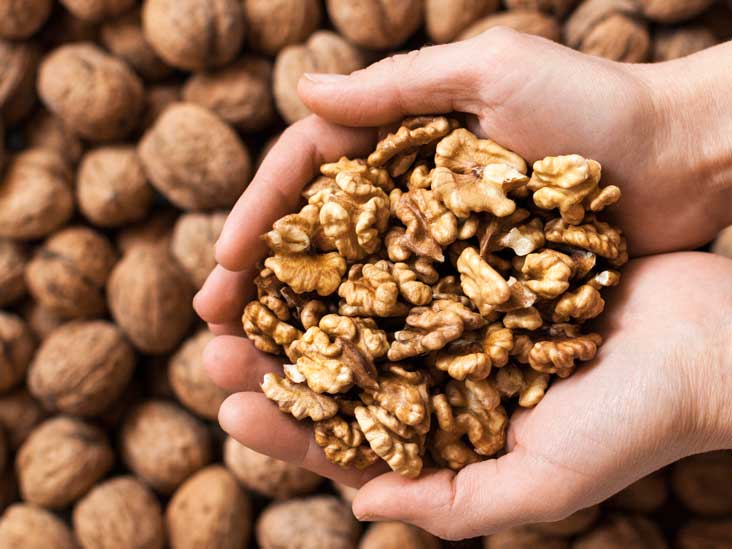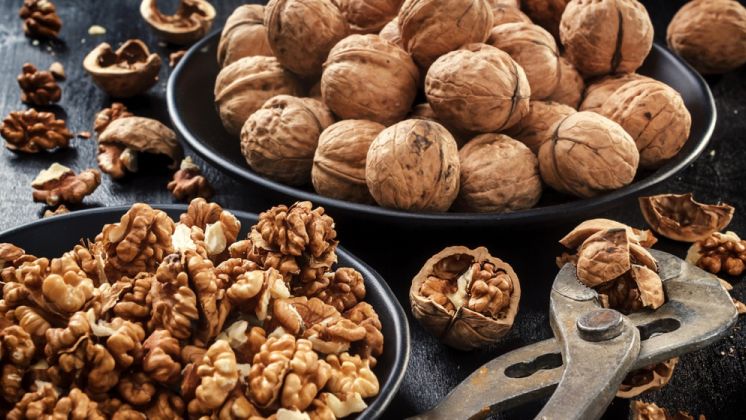It would be an understatement to suggest that walnuts are a healthful food. Among the many potential health benefits of walnuts is that they are a good source of healthy fats, fiber, vitamins, and minerals.
Due to the vast amount of study conducted on this singular nut, scientists and industry professionals have held an annual walnut conference at the University of California, Davis, for the past 50 years. English walnuts are the most widely grown and researched form in the genus.
High In Antioxidants

There is no other popular nut that can compare to the antioxidant activity of walnuts. The papery skin of walnuts contains significant concentrations of vitamin E, melatonin, and polyphenols, which are responsible for their function.
A small pilot trial with healthy people found that a supper high in walnuts reduced the after-meal oxidation of "bad" LDL cholesterol, but a meal high in refined fat did not. It's helpful because atherosclerosis, brought on by oxidized LDL, can build up in your arteries.
Omega-3-Rich Plant
With 2.5 grams of omega-3 fat per 1-ounce serving, walnuts far outperform all other nuts in this category. Alpha-linolenic acid is the name for the omega-3 fat found in plants like walnuts. It's a kind of fat called an "essential fatty acid," and humans can't survive without it.
The Institute of Medicine recommends that men and women consume 1.6 and 1.1 grams of ALA daily. One handful of walnuts satisfies that recommendation. Observational studies have revealed that a daily intake of 1 gram of ALA reduces the risk of death from cardiovascular disease by 10%.
Reduces Inflammation

Oxidative stress is the root cause of inflammation, at the center of many illnesses, such as cardiovascular disease, type 2 diabetes, Alzheimer's disease, and cancer. To combat oxidative stress and inflammation, the polyphenols found in walnuts can be helpful. Ellagitannins, a kind of polyphenol, play a pivotal role.
The urolithins produced from the conversion of ellagitannins by the good bacteria in your gut have been shown to provide anti-inflammatory protection. Walnuts' ALA omega-3 oil, magnesium, and arginine amino acids may help reduce inflammation.
Supports Healthy Gut
According to research, having a healthy gut and excellent health has been linked to a high concentration of beneficial bacteria and other microorganisms in the digestive tract. Inflammation and disease can develop in the heart and other body parts if your microbiota isn't balanced.
This can lead to weight gain, cardiovascular disease, and even cancer. The composition of your microbiota can be significantly affected by the foods you eat. Eating walnuts may help maintain a healthy microbiome and digestive system.
Over eight weeks, 194 healthy people who consumed 1.5 ounces of walnuts daily had more beneficial bacteria than when they didn't eat walnuts.
Potentially Lowers Cancer Risk
Eating walnuts has been linked to a reduced risk of several malignancies, including breast, prostate, and colorectal cancer, according to in vitro, animal, and observational studies. Polyphenol ellagitannins are abundant in walnuts, as was previously mentioned.
Some bacteria can convert these in the stomach into substances called urolithins. Eating walnuts may reduce your risk of colorectal cancer because urolithins have anti-inflammatory effects on the digestive tract.
The anti-inflammatory properties of urolithins may offer further cancer protection. In addition, urolithins can inhibit hormone action by binding to and blocking hormone receptors.
Controls Weight
Nuts like walnuts have a high-calorie density. However, research suggests that only around 21% of the energy in those nuts gets absorbed. And there's some evidence that eating walnuts might help curb hunger.
After five days of ingesting the walnut smoothies, the individuals' brains revealed higher activation in a region that helped them resist extremely enticing food signals, such as cake and French fries.
Reduces Type 2 Diabetes Risk and Management
Studies on humans have shown a correlation between eating walnuts and a reduced risk of developing type 2 diabetes. When you're overweight, you're more likely to have sugar-related health issues, such as diabetes.
Nonetheless, there is evidence that consuming walnuts can aid blood sugar management via processes independent of their impact on weight control. One controlled trial found that 100 patients with type 2 diabetes who took their diabetic medication as prescribed and ate a healthy, balanced diet while taking one tablespoon of cold-pressed walnut oil daily for three months saw an eight percent reduction in their fasting blood sugar.




